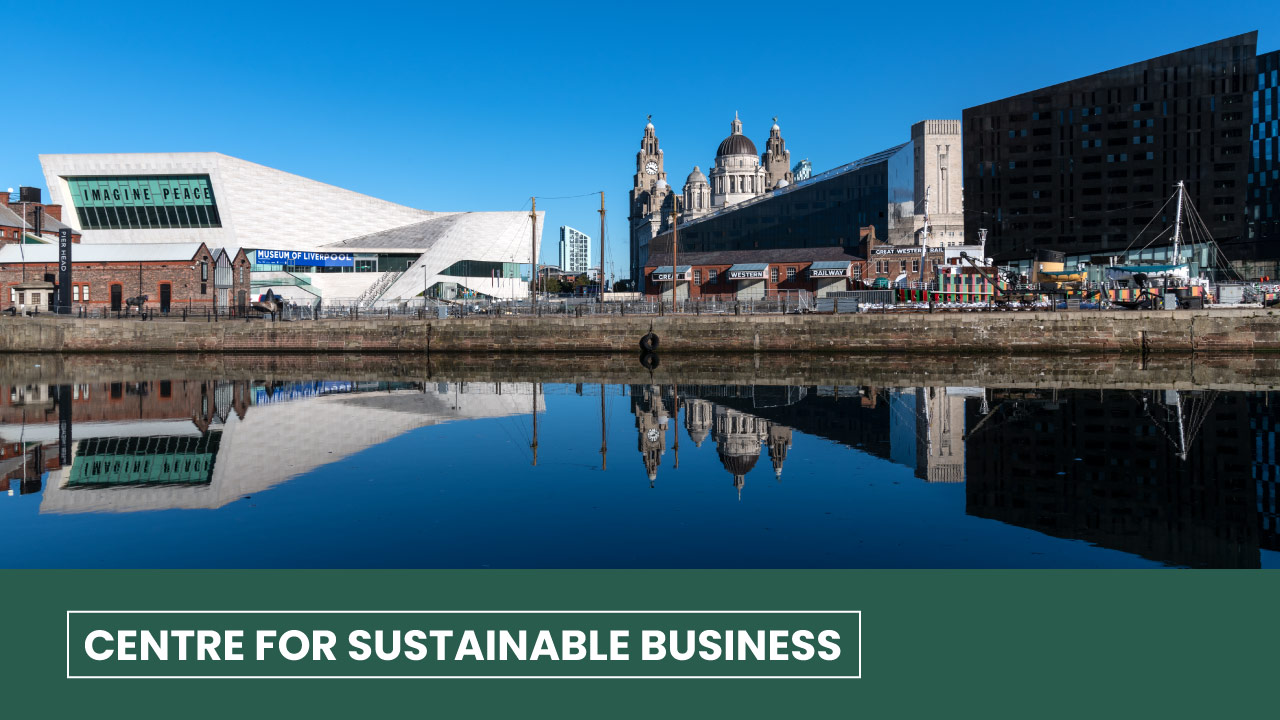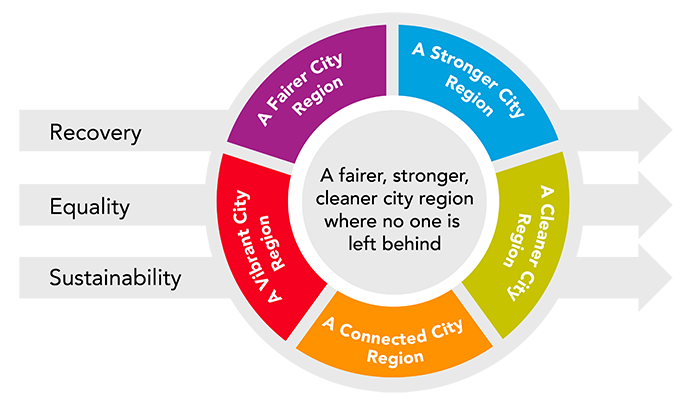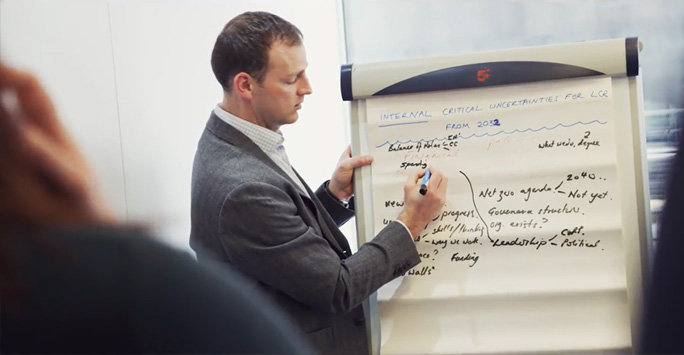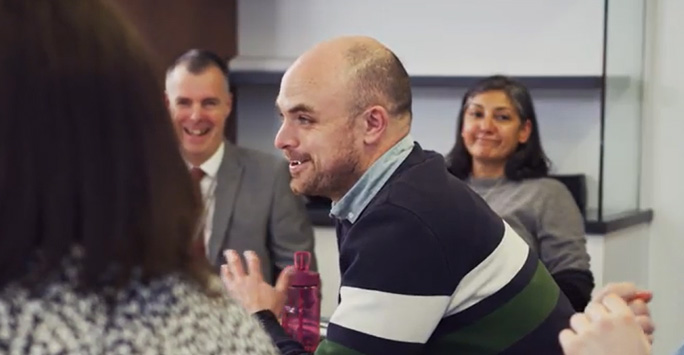Shaping preferable futures for a Social Value Framework in the Liverpool City Region
Posted on: 18 October 2022 in Research

How can academic research support the development of a social value strategy for the Liverpool City Region that creates a more preferable future?
Research led by experts at the Centre for Sustainable Business (CSB), has supported the Liverpool City Region Combined Authority (LCRCA) in shaping their Social Value Framework.
Social value captures the difference a project can make to the community it operates in.
The CSB Research Team facilitated a series of innovative participatory ‘futures’ workshops, where LCRCA decision makers constructed multiple ‘probable’ and ‘plausible’ futures.
This allowed them to ‘step into and look around’ to explore and challenge how social value might impact the region in 2032, in each of the scenarios.
Holistically analysing the complex and interacting factors at play in desirable future scenarios, helped LCRCA reveal deep-rooted, but hidden, assumptions, as well as the tasks, policies, responsibilities and actions needed today to shape preferable and socially equitable futures.
Context
From January 2021, the Public Services (Social Value) Act (2012) was updated to mandate social value to be explicitly evaluated, rather than just considered, in new governmental commercial activity, with a minimum weighting of 10% in all public procurement tenders.
What is social value?
According to the UK Government, social value derived from procurement is “the positive legacy created through the performance of a contract” in relation to three categories:
- Social (e.g. activities that promote a united community)
- Environmental (e.g. efforts to assist the community in reducing waste or pollution)
- Economic (e.g. training, employment or apprenticeship opportunities for disadvantaged groups)
This means larger suppliers are no longer able to win on scale alone, as information on what and how bidders will deliver procurement contracts, will be scored in bid evaluations.
The new Social Value Model favours quality over quantity, as it seeks to understand the social, environmental and economic impact organisations can have on their communities.
However, it is contingent on each authority to define social value for their specific communities and contexts.
Research Issue
As emphasised by LCR Metro Mayor, Steve Rotheram, social value “means the Combined Authority getting a ‘bigger bang for its buck’ than simply the lump sum we invest in any given project.”
“Our new Social Value Framework will guide how we invest our resources, so that we grasp every possible opportunity to deliver a fairer, more socially just City Region, where no one is left behind.”
The Metro Mayor’s personal commitment to delivering social value in the region, enhances the LCRCA’ position to influence the implementation of impactful policies through the mayoral office.
Although, social value creation is transversal to LCRCA’s five priority areas, difficulties in measuring the value delivered to communities, and the complex interplays with other policy initiatives, meant social value policies were potentially missing opportunities to maximise their impact.

LCRCA Five Priority Areas. Source: LCRCA website
LCRCA Assistant Director for Evidence, Research & Intelligence, Kate Downes, and Equalities and Inclusion Advisor, Lynn Collins, co-developed a proposal with Professor of Responsible Procurement, Jo Meehan, aimed at achieving the following objectives:
- Providing a long-term view of ‘plausible’ and ‘preferred’ futures for social value
- Identifying key blind spots, critical uncertainties and the implications of actions related to the LCRCA’s Social Value Framework
Research Approach
The design of the future scenarios methodology for the LCRCA, was underpinned by Professor Meehan’s research ‘Researching the future of purchasing and supply management: The purpose and potential of scenarios’, and her REF21 impact case study on the development of a new national procurement standard for delivering value in social housing and healthcare.
The complexities and scale of the climate emergency and social inequalities mean the future is unlikely to be a linear continuation of the past or present, and disruptions can have unexpected and unintended consequences.
While most methods for future business planning tend to look backwards, in attempts to predict what is to come, the research team considered the best way to prepare for the future is to better understand how we create it, and then shape it.
Scenario planning allows for a deeper understanding of what elements need to be considered for preferable futures to happen, which serves as a solid foundation for long-term strategic planning.
What is participatory scenario research?
Participatory scenario research is a methodology in which researchers and participants plan for multiple uncertain futures, by exploring the opportunities, threats and potential impact of a range of probable and plausible scenarios of what might happen.
Scenario planning is a tool that prompts policymakers to anticipate multiple plausible futures, and via a step-by-step process of envisioning different future situations, this method supports an actionable path to shaping desirable futures.

Masters in Research student Michel Devine, during one of the LCRCA scenario planning workshops
For the LCRCA project, the research team interviewed a range of staff and senior leaders, to assess their assumptions and predicted outcomes of the policy.
Analyses of the interview data were used in the design of the scenario workshops, to enable key decision makers to construct and contrast a range of plausible outcomes for the year 2032.
The constructed scenarios were a creative tool used to encourage participants to think holistically and systemically on the long-term impact of current decisions, and to examine a range of interacting factors that impact communities.

LCRCA decision makers discussing social value at a scenario planning workshop
This is particularly important for social value, as it has many complex roots and its timeframe for delivery is often longer than the lifespan of procurement contracts.
As a methodology for researching the future of social value, scenario planning helped to open up the discussion around the critical uncertainties to consider in order to enhance the social value of future LCRCA activities, which included:
- Partnerships
- Climate change
- Public health
- Procurement and supply chains
- Legislation
- Economic growth
- Transport and infrastructure
- Education
- Funding,
- Organisational structures,
The data from the workshops was further analysed by the research team, and findings and insights were presented to the LCRCA.
Research Impact
The research collaboration with the LCRCA Social Value Policy Team resulted in Social Value Framework and Policy, incorporating new insights into how social value could, and should, be embedded into policies and processes to maximise opportunities and support for communities across the LCR.
Read the LCRCA Social Value Policy and Framework 2022
An informative video was also created for the wider LCRCA community and stakeholders, where the team highlighted how working with experts at the Management School’s helped them integrate social value as a key element within their planning process.
At an academic level, this research collaboration provides opportunities for critical theory building in the field of public procurement within management, policy, and social justice/law literatures, and opens opportunities for potential cross-faculty collaboration.
The project has strengthened existing LCRCA relationships, which can be leveraged for future policy research, in relation to:
- Exploring operational barriers to deliver social value within public procurement
- Developing a baseline for longitudinal comparison following the recent legislative change
- Providing comparative empirical data across national and local government organisations
Kate Downes (Assistant Director for Evidence, Research & Intelligence) and Katie Dean (Strategic Transformation Lead) from the LCRCA will share their experiences of working with the Management School at the Centre for Sustainable Business launch event on 18 October 2022 at 5pm.
Future plans include delivering several ‘Business Breakfasts’ to local businesses, focused on the results and future direction of the LCRCA’s social value policy, many of which will be suppliers, and directly affected by the government’s changes to procurement tendering.
| Research Team | |
|---|---|
 |
Professor of Responsible Procurement and Director of the Centre for Sustainable Business |
 |
Postgraduate Research Student and Graduate Training Fellow |
 |
Michael Devine Masters in Research student |
|
Under the CSB’s research theme of ‘Non-Financial Reporting and Accountability’, the team are researching how public organisations are embedding social value in their supply chains, and in their wider policies and practices. Alongside traditional case study and qualitative research methods, they are adopting futures based approaches that aim to anticipate change, and through its focus on participation with key stakeholders, enables organisations to shape and develop environments to deliver preferable, socially-just futures. |
|
Subscribe to the Centre for Sustainable Business newsletter
Keywords: Centre for Sustainable Business, Sustainability, Non-Financial Reporting and Accountability, Social Value, Public procurement, Case study, Research impact.